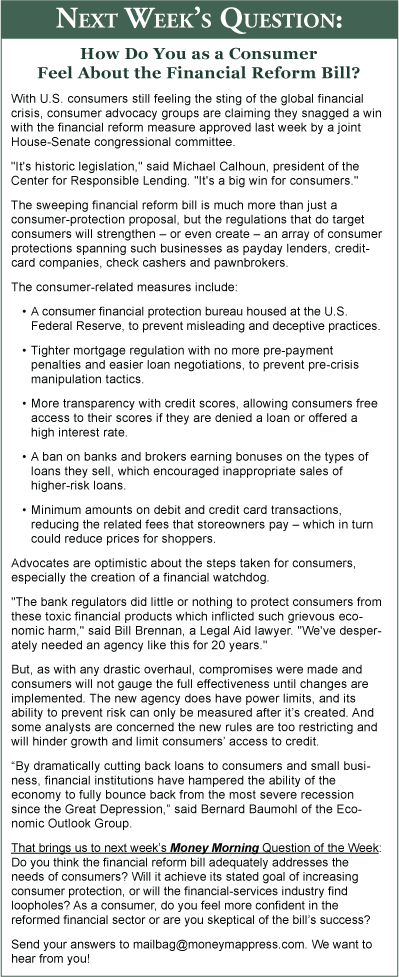After months of intense political pressure, China last week announced that it would allow its currency to gradually appreciate against the U.S. dollar. China's currency - the yuan - has been pegged to the American greenback since 2008.

"This is going to lead to a transition from export-lead, investment-lead to more of a consumption-lead economy going forward," Jing Ulrich, chair of China equities and commodities at JPMorgan Chase & Co. (NYSE: JPM), told CNBC. "I think the ramifications are profound not just for the next few months but actually for the coming years."
Not surprisingly, U.S. exporters embraced the news as an opportunity to compete against Chinese companies and to reduce the U.S. trade deficit. Foreign nations, including the United States, have accused China of undervaluing its currency to give its exporters an advantage in global trade.
Chinese domestic consumption stands to benefit the most, as consumers will have more purchasing power on top of China's recent wave of multi-industry wage increases. Western companies that reach out to Mainland China can access a consumer base with more money and an increased desire to spend, which should give Western investors a chance to cash in on climbing profits.
However, not everyone will see immediate benefits from the new currency policy. In fact, the combination of big double-digit wage increases in China and an increase in the yuan will reanimate inflation.
U.S. shoppers will eventually feel the squeeze: As wages in China soar - adding to the cost of Chinese-produced products - U.S. retailers will be forced to raise prices and to pass those higher prices along to consumers.
Money Morning Contributing Editor Martin Hutchinson warns that investors need to prepare now for the inflationary currents that are heading toward the U.S. market.
"China will export these inflationary pressures into the U.S. market, meaning investors must position themselves for this eventuality," he said. "[T]he imports on which the rich nations too intently depend will rise in price. Thus, inflation will return to the ‘rich' countries - via the poor ones. For investors, the accompanying erosion of purchasing power will be difficult to deal with."
This prompted last week's installment of Money Morning Question of the Week: Given the developments unfolding half a world away in China , are you worried about a resurgence in inflation? If so, how are you preparing as an investor for the impact currency appreciation will bring to companies and markets? What about as a consumer? Do you think the gradual increase will have as much of an effect on global trade, retailers and economic growth as touted, or will the impact be muted?
Here is a collection of reader responses detailing thoughts on inflationary pressures and global currency.
Inflation Observations from the Mainland
Echoing Martin Hutchinson's remarks regarding labor costs in China and inflationary pressures, living in the Mainland I hear, see, and know such comments ring true. As government figures suggest inflation perhaps in the 2%-3% range, white-collar job applicants request close to and upwards of 100% pay increases and often receive as much or more from Global 1000 companies and even some Chinese-domiciled businesses. In addition to young Chinese job-hopping in numbers unseen in prior overseas experience, in search of the next pay increase they do their best Usain Bolt impersonations.
If salaries and wages were the only indication of inflation, perhaps the sub-3% increases might be more believable. Unfortunately, prices for food, real estate, and a variety of other products and services are spiking dramatically. Can the government contain such inflationary price pressures? Hmmmm ... to be decided!
- J. G.
Shanghai, China
Inflation Brings Investment Opportunity
The slow revaluing of the yuan is exactly what we have been waiting for. This is the Backflow Boom that John Templeton alludes to. These people are going to be our customers en-mass. Yes it will be inflationary - but invest in that you must.
We will need a new planet to satisfy demand.
I am U.K-based, and I think most investors, unless they all strictly defensive, are commodity orientated knowing that there is a huge move in the coming world order. We are likely to be the new Third World, and one way to avoid that is invest in the thirst for all commodities by the new middle class, coming from the old Third World.
- Ian H.

Global Currency To Crumble
Am I worried about inflation? I guess I am, but only as a subset of concern about general monetary instability. The underlying problem in the United States, and probably most of Europe, is that we are consuming more than we produce. We balance this out by creating dollars (or euros), and sending them to countries that produce more than they consume, to purchase their surplus, as a promise that someday we will increase our production to redeem those currency units. We will default on this promise, and we both know it.
However, we both/all depend on this fiction to keep the present system going, and nobody can see any way to get off the merry-go-round without picking up some bangs and bruises, or worse. But the merry-go-round is picking up speed, and it is getting harder and harder for everyone to hang on.
The real solution would be for the United States and other debtor nations to cut back on overhead (social services, government spending, etc.) and work to produce more, but that is politically impossible with current populations and expectations.
People talk about this currency or that one being stronger or safer, but I am skeptical. If the dollar or euro loses favor, not just to lose a fraction of their value, but to reach a point where nobody wants them, then I can't see how commerce can continue. Oh, it might continue after a fashion in the United States, where we would be compelled to use dollars, but imports would stop . The entire global infrastructure of commerce and trade depends on the smooth flow of currencies of known and relatively stable values, but those known and stable values are growing less stable and certain by the day, and when any significant currency blows up, I think the whole system will fall apart. It is just too interlinked.
So yes, we are likely to see inflation, and possibly deflation as well, but at some point I think that the whole system will be torn apart by its own internal contradictions, just as a merry-go-round might if it began spinning too fast, and we are going to find out how well we can survive on what we have and what we know. Gold and silver in our personal possession may have some value at that point, although I suspect that food, cigarettes, ammunition, and the ability to do useful things may have more immediate value in a post-collapse barter system. I don't expect this to happen right away, but on the other hand, when it does happen, I think it will catch most of us by surprise. When the time for performance arrives, the time for preparation is past, so don't waste the time you have now.
- Gordon F.
No Money = No Inflation Problems
If inflation means too much money chasing too few goods than we will never have inflation again. There is no money left for the people, for the banks, for businesses, or for the government. Only the rich have money and they are not investing it here in the United States. Until that changes look for deflation.
China is sucking over $1 trillion per year out of the United States and Europe with artificially low prices. No wonder the world has a money shortage and must resort to austerity measures!
- L.D.
Don't Forget About Greece…
I'm not too worried about inflation. The move in the yuan will increase it, but not as much as what can happen in the European Union. The EU's "too big to fail" episode for Greece (A.K.A "Grease") will slip and slide into a deflationary meltdown for Spain and on and on to global proportions.
- "Money Mapper" John
[Editor's Note: Thanks to all who responded to last week's installment of the Question of the Week feature regarding inflation related to China's currency. Be sure to answer next week's question: How do you as a consumer feel about financial reform?
Send your answers to [email protected]!
Is there a topic you want to see covered as a Question of the Week feature? Then let us know by e-mailing Money Morning at [email protected]. Make sure to reference "question of the week suggestion" in the subject line. We reserve the right to edit responses for length, grammar and clarity.
Thanks to everyone who took the time to participate - via e-mail or by posting their comments directly on the Money Morning Web site.]
News and Related Story Links:
- CNBC:
Rally Over China's Yuan Move Fades as Quickly as It Began - The New York Times:
Exporters Optimistic Over Move On Currency
- Money Morning:
Why China's Foxconn Will Hurt the Global Economy More Than the BP Oil Spill - Money Morning:
These Five Inflation Plays Will Provide Protection and Profits
- Money Morning:
China's Plan For Yuan Appreciation Likely to Boost Inflation in U.S. & Lift Chinese Consumer Stocks
- Money Morning News Archive:
Question of the Week Feature


